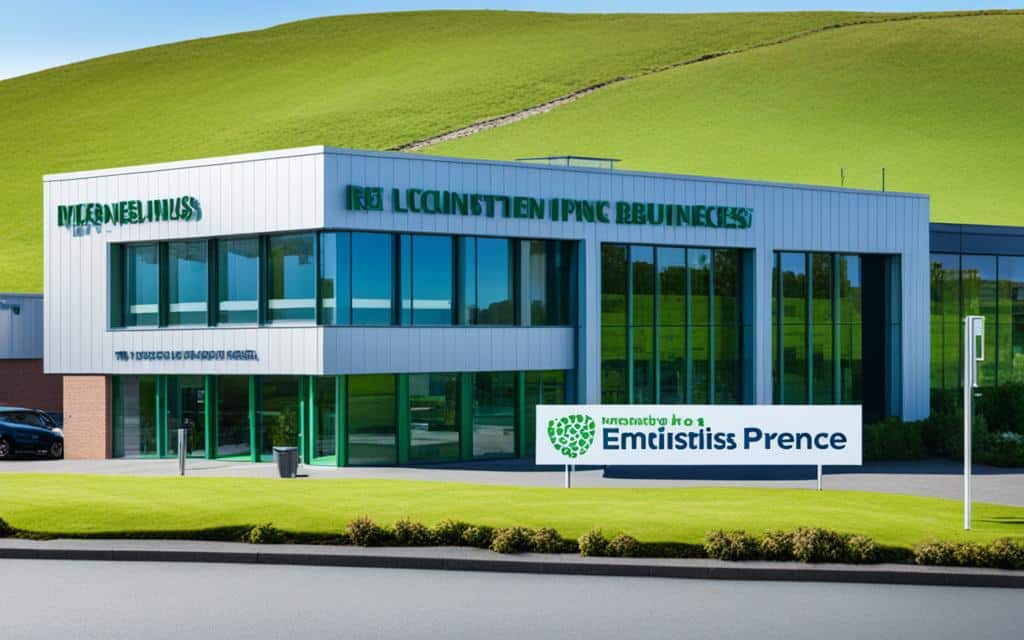Are you considering expanding your business to Ireland? Look no further! In this guide, we will provide you with all the essential information and strategies you need to establish a successful business presence in Ireland. From understanding the Irish business environment to navigating legal requirements, finding the ideal location, and building a strong network, we’ve got you covered.
Starting a business in Ireland can be a rewarding venture, thanks to its vibrant economy, skilled workforce, and favorable tax environment. Whether you’re a small startup or a multinational corporation, Ireland offers countless opportunities for growth and expansion.
However, entering a new market can be challenging, and it’s essential to have a clear understanding of the local business landscape. That’s why we’ve curated this guide, taking into account the unique characteristics of the Irish market.
So, if you’re ready to embark on this exciting journey, let’s dive in and explore how to establish a successful business presence in Ireland. We’ll provide expert guidance and insights that will set you on the path towards thriving in the Irish market.
Understanding the Irish Business Environment
Before delving into the process of setting up a business in Ireland, it is paramount to gain a comprehensive understanding of the unique characteristics that shape the Irish business environment. By familiarizing yourself with the market trends, cultural nuances, legal framework, and competitive landscape in Ireland, you will be well-prepared to navigate the intricacies of doing business in this dynamic country.
Market Trends
Ireland’s business landscape is continually evolving, driven by various economic factors and emerging trends. Stay informed about the latest market trends in your industry to identify opportunities and stay ahead of the competition. Conduct thorough market research to analyze consumer behavior, assess market demand, and determine the feasibility of your business idea within the Irish market.
Cultural Nuances
Cultural nuances play a crucial role in establishing and maintaining successful business relationships in Ireland. Take the time to understand the local customs, etiquette, and communication styles. Building strong rapport with your Irish counterparts through respectful and culturally sensitive interactions can pave the way for fruitful collaborations and partnerships.
Legal Framework
The legal framework governing businesses in Ireland is comprehensive and adheres to European Union regulations. Familiarize yourself with the legal requirements for establishing and operating a business in Ireland, including company registration, tax obligations, employment and labor laws, data protection regulations, and intellectual property rights. Seek professional legal advice to ensure compliance and mitigate any legal risks.
Competitive Landscape
Ireland’s business environment is characterized by a diverse range of local and international competitors. Conduct a thorough competitor analysis to identify your unique selling points and differentiate your business from others in the market. Identify gaps and niches that your business can fulfill, and develop a competitive strategy to position your brand effectively.
To thrive in the Irish business environment, it is vital to stay adaptable, responsive, and well-informed about the evolving market dynamics. As you embark on your journey to establish a presence in Ireland, remember to leverage the insights gained from comprehending the unique characteristics of the Irish business environment.
Choosing the Right Business Structure
Selecting the appropriate business structure is vital for operating successfully in Ireland. When establishing your business, it’s essential to consider the various options available and choose the structure that best aligns with your specific needs. Let’s explore the different business structures commonly used in Ireland:
Sole Proprietorship:
A sole proprietorship is the simplest form of business structure in Ireland. As the sole owner, you have complete control and responsibility for the business. However, keep in mind that your personal assets are not protected from business liabilities.
Partnership:
If you plan to start a business with one or more individuals, a partnership structure might be suitable. In a partnership, all partners contribute to the business and share profits, losses, and liabilities according to the partnership agreement.
Limited Liability Company (LLC):
A limited liability company, often referred to as an LLC, is a popular choice for businesses in Ireland. This structure provides limited liability protection to its shareholders, shielding their personal assets from business debts. It also offers flexibility in terms of ownership and taxation options.
Branch Office:
If you already have a business operating outside of Ireland, establishing a branch office can be a convenient option. A branch office is an extension of the parent company and is subject to the same legal entity. Keep in mind that a branch office is not a separate legal entity and is directly governed by the parent company’s regulations.
When selecting the appropriate business structure, consider factors such as liability protection, taxation, ease of setup, and continued compliance. Consulting with legal and tax professionals can provide valuable guidance to ensure you choose the structure that suits your specific requirements.
Meeting Legal and Regulatory Requirements
When starting a business in Ireland, it is crucial to ensure compliance with the legal and regulatory requirements. By understanding and fulfilling these obligations, you can establish a strong foundation for your business’s success. Here are the key steps to navigate the legal landscape in Ireland:
- Registering your business: The first step is to register your business with the Companies Registration Office (CRO). This process involves providing required information and paying the necessary fees. Registering your business ensures its legality and protects your brand.
- Obtaining licenses and permits: Depending on the nature of your business, you may need to obtain specific licenses and permits. These include permits for certain industries, health and safety licenses, and food and beverage licenses. It is essential to research and comply with the relevant licensing requirements.
- Complying with tax obligations: Understanding and fulfilling your tax obligations is vital for operating legally in Ireland. This includes registering for taxes, such as VAT (Value Added Tax) if applicable, and filing accurate tax returns. It is advisable to engage with a qualified tax advisor to ensure compliance with the complex tax regulations.
- Understanding employment regulations: If you plan to hire employees, it is important to familiarize yourself with Irish employment regulations. This includes understanding minimum wage requirements, employment contracts, and workplace health and safety standards. Compliance with these regulations contributes to a fair and productive work environment.
By adhering to the legal and regulatory requirements in Ireland, you can establish a solid legal framework for your business. This not only ensures compliance but also builds trust with customers, suppliers, and partners, ultimately contributing to your long-term success.
Finding the Ideal Location and Office Space
The success of your business often depends on choosing an optimal location and finding suitable office space. When selecting a location in Ireland, several key factors should be considered.
- Proximity to target markets: Find a location that allows easy access to your target audience, whether it’s a local customer base or potential clients across the country.
- Access to transportation networks: Consider the availability of transportation options such as airports, ports, and major roadways. This ensures smooth logistics and connectivity.
- Availability of amenities: Evaluate the availability of essential amenities like banks, restaurants, retail establishments, and accommodations to meet your business needs and support your employees.
Once you’ve identified the ideal location, the next step is to find office spaces that align with your business requirements. Whether you’re looking for traditional office spaces or shared coworking environments, consider the following:
- Space requirements: Analyze your current and future space needs. Determine the number of employees, equipment, and facilities necessary to support your operations.
- Cost considerations: Evaluate the rental costs, including lease terms, utilities, maintenance fees, and any additional expenses associated with the office space.
- Infrastructure and facilities: Assess the availability of essential facilities like meeting rooms, conference facilities, parking spaces, and technological infrastructure.
By carefully considering these factors and conducting thorough research, you can find the perfect location and office space in Ireland that will contribute to the growth and success of your business.
Navigating Irish Tax System and Incentives
Exploring the intricacies of the Irish tax system is crucial for businesses operating in Ireland. With one of the most favorable tax environments in Europe, understanding the Irish tax landscape can help you optimize your tax strategy and avail of valuable incentives.
One of the key aspects of the Irish tax system for businesses is the corporate tax rate. Ireland offers a competitive corporate tax rate of 12.5%, attracting multinational companies from around the world. This low rate allows businesses to retain a greater portion of their profits, enabling reinvestment and growth.
In addition to corporate tax, Ireland also imposes Value Added Tax (VAT) obligations. VAT is a consumption tax applied to most goods and services. Understanding the VAT registration process and compliance requirements is essential for businesses to operate smoothly within the Irish market.
Irish tax incentives provide businesses with significant opportunities for tax optimization. These incentives aim to promote certain industries, economic development, and job creation. For example, the Research and Development (R&D) Tax Credit encourages businesses to invest in innovation by providing tax relief on qualifying R&D activities. The Employment and Investment Incentive (EII) scheme offers tax relief to investors supporting small and medium-sized enterprises (SMEs) in Ireland.
By navigating the Irish tax system and capitalizing on tax incentives, businesses can effectively manage their tax obligations and gain a competitive advantage. Consulting with tax professionals or engaging tax advisors can further enhance your understanding and help develop a tailored tax strategy for your business.
Stay informed about the latest changes in the Irish tax system and explore the available incentives to ensure your business remains compliant and economically efficient.
Building a Strong Network and Partnerships
Establishing a strong network of contacts and partnerships is crucial for business success in Ireland. Building relationships within the Irish business community can open doors to new opportunities, collaborations, and valuable insights. In this section, we will discuss effective strategies to connect with relevant professionals and organizations, fostering a robust business network in Ireland.
1. Attend Networking Events
Networking events provide an excellent platform to meet industry peers, potential clients, and influential individuals in your field. Make sure to research and attend events that are relevant to your industry and target market. Prepare your business cards, practice your elevator pitch, and engage in meaningful conversations to establish connections that may lead to valuable partnerships.
2. Engage with Industry Associations
Industry associations play a vital role in bringing together professionals and businesses within specific sectors. Join relevant associations in Ireland and actively participate in their activities, such as conferences, seminars, and workshops. These platforms can help you gain industry insights, forge partnerships, and stay up-to-date with the latest trends and opportunities.
3. Collaborate with Local Entities
Forming partnerships with local organizations, businesses, and institutions can be mutually beneficial. Look for opportunities to collaborate on projects, share resources, or even co-create products or services. Such partnerships can provide access to new markets, enhance your brand reputation, and strengthen your presence in Ireland.
4. Leverage Online Platforms
In today’s digital age, online platforms offer immense potential for networking and forming partnerships. Utilize professional networking sites like LinkedIn to connect with professionals in your industry and join relevant groups and communities. Engage in discussions, share insights, and explore potential collaboration opportunities with like-minded individuals.
5. Build Relationships with Local Business Support Networks
In Ireland, various business support networks, such as chambers of commerce and trade organizations, provide valuable resources and connections for businesses. Reach out to these networks and explore ways to engage with them. Attend their events, leverage their expertise, and tap into their extensive network to expand your reach and establish strategic partnerships.
By implementing these strategies to build a strong network and partnerships in Ireland, you can position your business for growth and success. Remember, fostering meaningful connections and collaborations is key to unlocking new opportunities and gaining a competitive edge in the Irish market.
Essential Tips for Sustainable Growth
Building a sustainable business in Ireland is essential for long-term success in the dynamic Irish market. To achieve sustainable growth, it is crucial to implement effective strategies and best practices. Here are some essential tips to help you ensure sustainable business growth in Ireland:
1. Conduct Thorough Market Research: Prioritize market research to understand the evolving needs and preferences of your target audience. Use data-driven insights to identify market trends, assess the competitive landscape, and make informed business decisions.
2. Foster Customer Engagement: Invest in building strong relationships with your customers through effective communication and personalized experiences. Listen to their feedback, address their concerns promptly, and continuously improve your products or services to exceed their expectations.
3. Embrace Innovation: Stay ahead of the curve by embracing innovation and adapting to emerging technologies. Encourage a culture of creativity within your organization, foster collaboration, and explore new ideas to drive continuous improvement and stay competitive in the market.
4. Implement Effective Marketing Strategies: Develop and execute a well-defined marketing strategy that aligns with your business objectives. Leverage digital marketing channels, such as social media and search engine optimization, to reach your target audience effectively and amplify your brand visibility in Ireland.
By integrating these tips into your business strategy, you will be well-positioned for sustainable growth and success in the Irish market. Remember, sustainable growth requires constant adaptation and refining of your business practices, so continue to monitor market changes, analyze data, and adjust your strategies accordingly.

















